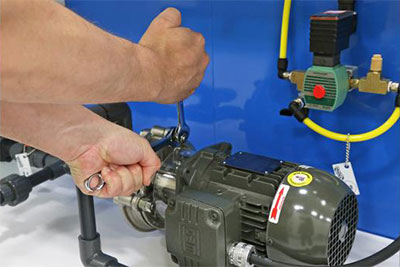There was a time, not long ago, when employers could rely on new hires to possess rudimentary knowledge of basic assembly methods, schematic diagrams, and the proper use of hand tools. These skills were the result of individuals who grew up maintaining their cars. Yet that way of life is largely a thing of the past, much to the dismay of employers. The current focus on advanced technologies and high-end skills is crucial and necessary, but you can’t overlook the need for basic skills, such as the ability to install bearings, lubricate machine slides, or align couplings.
|
ADVERTISEMENT |
Production managers recognize that these skills are the foundation for a company’s economic and technological progress. Whatever advancements occur, basic assembly skills will remain invaluable to manufacturing. Thus, even in the age of technology, it is crucial to consider the importance of basic skills and identify any gaps in your workers’ training so that those needs can be addressed.

Image 1: Tightening a fastener using a wrench and a backup wrench
…
Add new comment